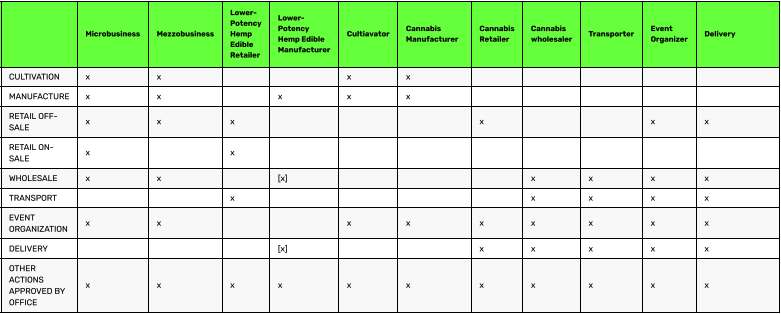July 14, 2023
We do not like giving the lawyerly answer but we have to in this case – it depends on a variety of factors, including the size of

the business, the rights you want to be able to exercise (e.g., wholesale, retail, manufacture, cultivation, etc.), and what you can qualify for.
At some point within the next year or two, we expect that the Office of Cannabis Management will issue rules and regulations that will clarify matters. For now, however, we only have what is written into the statute itself. The statute lists 16 different license types and each of those licenses comes with requirements and restrictions on what rights a business can exercise under each particular license. Sound confusing? It is.
A Minnesota cannabis microbusiness, for example, obtains “endorsements” for its license that may allow it to:
- Grow cannabis plants
- Make cannabis concentrate
- Make hemp concentrate (with a delta-9 THC concentration of more than .3%)
- Manufacture artificially derived cannabinoids
- Manufacture adult-use cannabis products and hemp products
- Purchase cannabis and hemp concentrate
- Package and label cannabis flower
- Sell cannabis products
- Operate a business that permits on-site consumption of edible cannabis products and lower-potency hemp edibles
This is not an exhaustive list of the rights available to a Minnesota microbusiness license holder – just some of the highlights. A microbusiness licensee can also hold a cannabis event organizer license, but no other cannabis licenses.
On the other hand, a cannabis manufacturing licensee can:
- Purchase cannabis from another licensed business
- Purchase hemp concentrate
- Accept cannabis flowers from unlicensed persons (up to two ounces on a single occasion)
- Make cannabis concentrate
- Sell cannabis products to other licensed businesses
Again, this list is not exhaustive. When it comes to other licenses that a manufacturing licensee can hold, there are four in Minnesota – a cannabis cultivation license, a medical cannabis cultivator license, a medical cannabis processor license, and a cannabis event organizer license.
A CLOSER LOOK AT LICENSES A LICENSEE CAN HOLD
A cannabis retailer has the right to purchase cannabis and hemp (along with products derived from either) and to sell cannabis and hemp products. As far as additional licenses that a cannabis retailer can hold, the law permits them to hold a cannabis delivery license, a medical cannabis retailer license, and a cannabis event organizer license.
As you can see, your business plan needs to account for what license you want to obtain and what you are permitted to do under that license, as well as what other licenses you are allowed to own. If, for example, I wanted to be a cannabis manufacturer and a cannabis retailer, I could not do so with Minnesota’s current license guidelines — other than as a microbusiness or mezzobusiness. This means you cannot just dive in and play it by ear — you need to know what your business is legally allowed to do.
We have put together a working chart (below), showing what rights you can have with specific licenses. It is a working chart because every situation will be different, the law will likely change before there are licenses issued, and we have no rules/regulations in place yet. We hope it gives you a sense of what sort of license you may be interested in obtaining.

Some of the x’s are in brackets because they’re not clear yet. A lower-potency hemp edible manufacturer licensee, for example, has the right to manufacture products and the right to “sell” hemp products to other hemp businesses. There is no express authorization for wholesale of products by a hemp edible manufacturer, but with the right to “sell” to other cannabis and hemp businesses does it imply that the right to wholesale is built into the hemp edible manufacturing license? These issues will likely be sorted out in revisions to the law and by rules/regulations.
HOW DO I KNOW WHICH LICENSE I SHOULD PURSUE?
If you’re not sure whether a Minnesota cannabis cultivation license, medical cannabis cultivator license, a medical cannabis processor license, or a cannabis event organizer license is the best choice for your ultimate goals — that’s okay. We’ll take an even closer look at each before outlining next steps for opening a cannabis business or dispensary in Minnesota.
- Cannabis Cultivation Licenses. The details regarding this license can be found by looking up Minnesota Statute 342.30. This license entitles the holder to grow cannabis plants within an approved amount of space. It also allows for plants to be grown from seed or immature plant to mature plant, harvesting of cannabis flower from a mature plant, the packaging and labeling of plants (seed to mature), the sale to other cannabis businesses, transportation of flower to a manufacturer located on the same premises, and additional actions requiring approval from the office.
- Medical Cannabis Cultivator and Processor Licenses. The details regarding these licenses can be found by looking up Minnesota Statute 342.47. It’s important to note that the Division of Medical Cannabis may oversee the licensing and regulation of medical cannabis businesses. Statute 342.47 covers the issuing of medical cannabis cultivator, processor, retailer, and combination business licenses — all involved with the use of cannabis for defined medical purposes. The office may limit the number of medical cannabis business licenses that a person or business may hold and there are rules, mentioned above, about which licenses can be held at the same time — make sure to review the statute before applying for these licenses to make sure your plan aligns with what is allowed.
- Cannabis Event Organizer License. The details regarding this license can be found by looking up Minnesota Statute 342.39. This type of license entitles the holder to organize a temporary cannabis event lasting no more than four days. In order to receive this license, individuals will be required to submit information required under Section 342.14, Subdivision 1 and any rules adopted pursuant to that section. Additionally, they’ll need to be able to provide information about any other cannabis business license held by the applicant, the address and location where the event will take place, the event’s name and information about the grounds including entrances, exits, consumption areas and sales areas. There are additional requirements that can be found — and absolutely should be reviewed — when reviewing the full statute.
HOW TO OPEN A CANNABIS BUSINESS IN MINNESOTA
 Generally, opening a dispensary or cannabis business in Minnesota involves many of the same steps it takes to open any other business, but because of the state of the law on cannabis right now, there are additional things you have to consider before diving in to the industry:
Generally, opening a dispensary or cannabis business in Minnesota involves many of the same steps it takes to open any other business, but because of the state of the law on cannabis right now, there are additional things you have to consider before diving in to the industry:
1. Research laws and regulations
At this point, the laws regarding cannabis in Minnesota are in their infancy and we are likely to see revisions to the law over the next few years. You have to pay attention to those changes because they may directly impact what you want to do. And we do not yet have regulations but at least some Minnesota cannabis lawyers have been in the industry for years and can discuss rules that are common in other states that we expect to see and rules from other states that we do not expect to see.
2. Develop a business plan
You must create a comprehensive business plan. While it is a good idea for your own purposes, it is also required under the law. In fact, you will have to submit it as part of the application process if you want to obtain a license. Minn. Stat. 342.14, Subd. 1(8). Among other things, the business plan should include: (a) the expected size of the business; (b) anticipated growth; (c) methods for keeping records; (d) knowledge and experience of an applicant and any officers, directors, managers, or general partners of the business; (e) an environmental plan; and (f) “other relevant financial and operational components.” Id.
3. Plan Financing
You will need capital to start your business. This means you will have to obtain financing (whether from your own funds, a bank loan, investors, etc.). If you are going to seek out investors to generate funding, make sure that you pay attention not only to cannabis laws, but also to securities laws and regulations. This is especially true if not all of your investors are or will be accredited investors. Federal and state securities laws often require substantial disclosure be made to investors before the investor agrees to write a check. If you are going to develop a private placement memorandum, spend a lot of time thinking about risk factors because cannabis businesses face risks that no other businesses face.
4. Apply for Licenses
Each license type is going to come with its own rights and restrictions so make sure that you know what license you want to apply for and how that will limit your ability to grow. There is likely going to be a laundry list of details that you have to include in your application but we won’t know that until the rules are promulgated. The application may include questions about security, supply chain, sources of funds, etc.
5. Find a Location
You will – of course – have to find some location for your business (even if it is a non-brick-and-mortar business). What you have to be careful of are zoning restrictions that the city imposes. There are several cities in Minnesota, for example, that have prevented businesses from obtaining the right to sell even hemp-derived products, by establishing strict zoning requirements. For example, some cities have included zoning requirements that state a business cannot sell any product containing cannabinoids within 1,000 feet of a school or daycare. Cities with zoning restrictions are not going to care if you build out a space for your cannabis business not realizing that selling cannabis products would violate a zoning restriction – you will have to find a new use for the space or find someone willing to take over the lease. This is not a position you want to be in.
6. Establish Compliance Protocols
You will want to have steps in place so that any potentially non-compliant product or sale is flagged before the transaction is completed. For some, this may mean ensuring that deliveries are done in a methodical way and properly recorded to avoid confusion or it may mean not shipping products to certain states. There are a lot more issues to consider when it comes to compliance and you have to stay on top of it.
7. Stay Informed
As discussed above, the law legalizing adult-use cannabis in Minnesota is likely to be revised over at least the next few legislative sessions (if not more), and rules/regulations are often revised or even given different interpretations. It is important that you stay on top of these changes and that you have a Minnesota cannabis lawyer to help guide you through the labyrinth that is compliance in the cannabis industry.
If you have any legal questions about how to start your cannabis business, please contact our team of small business experts.
